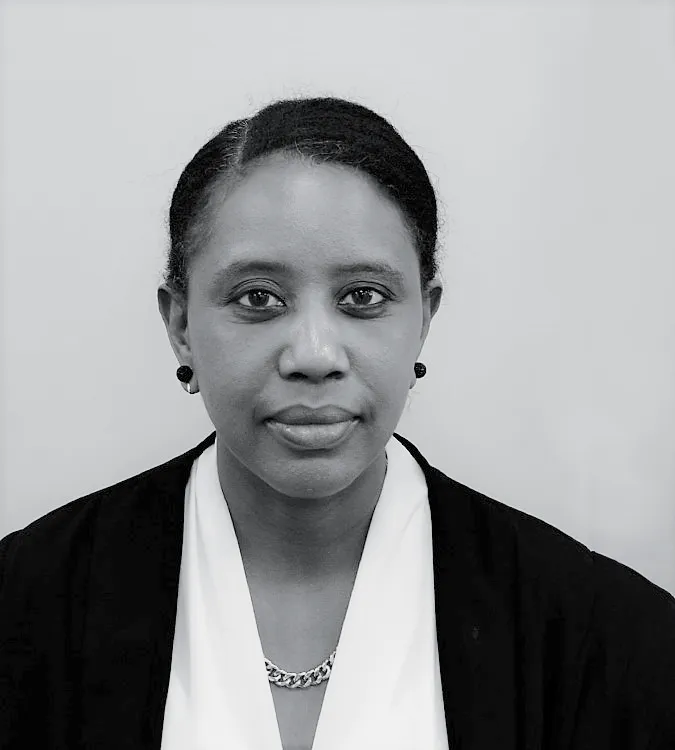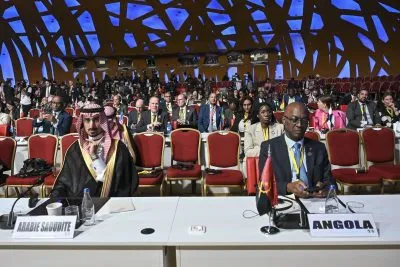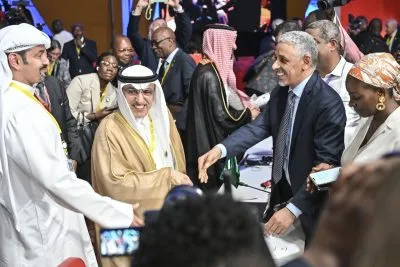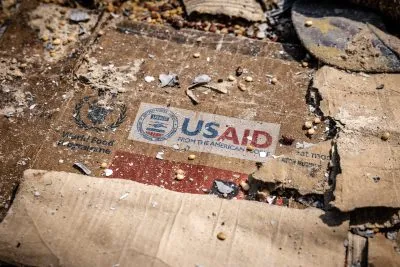On 14 June, at this year’s LSE Festival, ‘People and Change’, the session ‘Financing Climate Change: Inspiration for Change from African Thinkers’ hosted by the Firoz Lalji Institute for Africa provided important insight on how the dial needs to be changed for Africa in relation to climate finance. While African nations are among the most affected by the consequences of climate change, policymakers are attempting to address this inequity through climate credit, debt exchanges, and the Loss and Damage Fund.
Bogolo Kenewendo, UN Climate Champions’ Special Advisor, Africa Director, and Annet Nakyeyune, International Institute for Environment and Development, considered the ways in which climate change mitigation will be financed. They also addressed the environmental and ecological challenges the continent faces and critically evaluated climate capitalism.
Kenewendo emphasised how the narrative around green development has been strengthened with the support of Kenya’s president William Ruto. She also said that having the loss and damage fund on the agenda is a good signal of recognition of these issues alongside the strengthened narrative from non-state actors on adaptation and resilience. Kenewendo worries that currently African countries are financing adaptation and resilience with debt and this has become a big burden on their fiscus. She believes that in terms of climate action it is important to define what financial infrastructure actually means, and what the financing options for developing countries really are, and if they are sufficient.
These issues are now being pushed through at the Paris Summit and will be pushed on at the Africa Climate Summit in Kenya in September and will also look at multilateral development bank (MDB) reform. Nonetheless, she is cautiously optimistic despite the history around climate action of big pledges being made and nobody following up, or coming to an agreement and then it takes long to establish funds. This is where she fears, however, the loss and damage fund is finding itself stuck on.
She says: “I feel there is a re-energised sentiment because everyone knows that we have no other planet and everybody knows that we have to take responsibility for climate action if we are to reach any of our long term climate goals. But it is still quite differentiated and there are arguments at the moment about who really needs to take responsibility. But I am hopeful that the conversations that we will have around unlocking finance in Paris will move the needle further. Action, particularly in developing countries, will be moved through green finance.”
Nakyeyune said that while she would like to share Kenwendo’s optimism she really wanted to speak about how disconnected the climate finance architecture is to local African needs. “What are we doing with readily available finance? Are we achieving what we are meant to achieve?” she asks. She believes there is a lot of potential for governance to go wrong because climate action happens at the local level – “so how do we create those linkages in the climate finance value chain? Who are these actors and where are the connections? How can we ensure that climate finance flows in such a way to help with resilience and to help people to cope better with the changing climate?”
Nakyeyune is adamant that until local level actors are included in decisions about climate finance, Africa doesn’t stand a chance of achieving resilience and adaptation. So the initiatives being pushed must be connected to people at local level both national and international initiatives. Only 18% of finance pledged internationally goes to Africa.
A lot is being said about carbon finance being potentially transformative but should carbon credits not be issued by local communities? Nakyeyune says “We need to shift power back to local communities so that they can be supported”.
Kenwendo says that it should be remembered how varied Africa is on the ground. “What works where? What works in Botswana will not work in Uganda.” Furthermore, she emphasised the need for patient flexible funding schemes and the need to reform international financial infrastructure to make it inclusive and equitable. She asks: “How do we crowd in private sector financing and work with the MDBs towards credit enhancements? That is really where the issue is. That Africa only attracts 18% of green capital even though it has been exponentially growing shows there is clearly a basis in the global monetary system that needs to be dealt with. We keep hearing there is no pipeline of projects to invest in and it’s not true … There are projects. But they are not packaged in a way that London or New York based actors would respond to.”
Kenewendo says African countries need to urgently challenge market perceptions of developing countries including risk and perception of risk. She counters that there are constant issues of verification and start-up investment for local communities and yet “we know from players like Afrieximbank and AFDB, who are players on the ground that risk is lower than what it is perceived to be in New York or London”.
The problem, as she sees it, is a lack of appetite for investing in learning how things work in other markets, and moreover that climate finance should be “extra concessionary”. Kenewendo is right, this was just advanced by the World Bank that debt relief will now be offered for countries that have been affected by climate change, especially extreme weather events. But more can be done in exploring innovative and blended mechanisms to help scale climate finance flows such as philanthropic funding and biodiversity credits, as she argues.
This article originally appeared in IC Intelligence Insight 09: Climate & Nature Redux. Click to view more articles from the report.
Want to continue reading? Subscribe today.
You've read all your free articles for this month! Subscribe now to enjoy full access to our content.
Digital Monthly
£8.00 / month
Receive full unlimited access to our articles, opinions, podcasts and more.
Digital Yearly
£70.00 / year
Our best value offer - save £26 and gain access to all of our digital content for an entire year!


 Sign in with Google
Sign in with Google 



